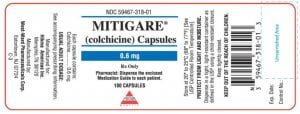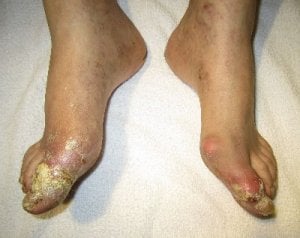But is it that simple?
No, there are many issues.
- Where does uric acid come from?
- You can’t buy it. Your body produces it by breaking down proteins. If you have too much, you’ve got hyperuricemia. I’ve covered 4 main reasons for excess uric acid below.
- How much is too much?
- No fixed level is right or wrong. 3-7 mg/dl is average. Some people have higher levels and no gout. If you have gout, you need to keep the level below 6 mg/dl.
- How can I control it?
- Managing uric acid is never easy. But there are several treatments that help. Understanding why you have a problem is the first step to solving it. Follow the guidance here and throughout my website to find ways to control uric acid that suit you.
 I show you the main points below. I’ve tried to keep it as simple as I can. This is a highly complex aspect of human biology involving biochemistry and molecular science.
I show you the main points below. I’ve tried to keep it as simple as I can. This is a highly complex aspect of human biology involving biochemistry and molecular science.
You don’t need to know all the details of hyperuricemia, but you should realize that there are no easy answers. If you understand some of these points it will help you understand why managing your gout in the long term is so complicated.
What is Uric Acid?
Uric acid is a natural substance in the body. Some animals break it down before excreting it, and never have a significant amount in their bodies. Humans do not produce the enzymes that do this, and uric acid will always be present.
In humans, the kidneys first extract uric acid from the blood. After removing other impurities, the kidneys return some uric acid to the blood. It is a vital part of human chemistry – as an antioxidant, it helps the body fight disease. Any excess should be excreted in urine.
In itself, uric acid is harmless, but high levels (a condition known as hyperuricemia) can lead to gout.

I deal with the process of how uric acid leads to gout pain (U-D-R-P) in more detail in the Explanation section.
Where does Uric Acid come from?
Uric acid is the final stage in the human metabolism of purines. Some of these purines can come directly from diet. But the vast majority comes from your own body. Because an enzyme, xanthine oxidase, drives this natural process.
Although humans need some uric acid, an excess can cause problems if the natural processes get out of balance. There are many environmental and lifestyle factors that can trigger excess uric acid. I’ve dealt with specific triggers elsewhere.
- Here, we’ll look at general causes of excess uric acid or hyperuricemia. Because causes of high uric acid levels in the blood are either excess uric acid production or insufficient uric acid excretion. So there are 4 main reasons for high uric acid: –
- Metabolism
- Increased breakdown of cells through illness, starvation, exertion and other factors.
- Diet
- Increased production of uric acid from direct breakdown of food. Likely to be a small part of the problem, but can tip the balance.
- Enzymes
- Xanthine oxidase, in the liver, drives the final stages of purine metabolism, converting xanthine and hypoxanthine into uric acid. Injury and certain nutrition deficiencies appear to trigger increased xanthine oxidase activity. This can lead to an increase in the percentage of purines that convert to uric acid.
- Kidneys
- This complicated organ both secretes uric acid from the blood and reabsorbs it. The net effect will be either an increase or decrease in uric acid in the blood. pH levels and hydration are significant factors that affect this. There are many others including general health, medications, and heredity.
How much is too much?
Acceptable levels of uric acid vary from person to person. Most males under 40 and pre-menopausal women do not need to worry. Unless there is a history of gout in the family. Anyone showing any signs of joint problems – swelling, numbness or tingling – should also be concerned.
To measure hyperuricemia properly you need to know your uric acid levels. Only a proper blood test from a qualified practitioner can do this. Avoid home uric acid testing kits. The method of obtaining a sample for home test devices will not produce accurate results.
People with no gout symptoms
If you have no signs of gout, anything above 7 mg/dl indicates a potential problem. Many people live with hyperuricemia throughout their lives, with no effects. You do not need to worry at this stage, but be aware that your risk of developing gout is higher than average. Watch for signs of problems in and around the joints. Uric acid crystals do not always cause gout pain and can go unnoticed for years.
Ultrasound and MRI techniques are being investigated to test for uric acid deposits. Until they are perfected and widely available, you should ask your doctor to arrange for samples to be drawn from the affected joint and analyzed under a microscope.
People with gout
If you have had gout then you must keep your level below 6 mg/dl. This level will encourage existing deposits to dissolve and minimize the chance of new deposits forming.
How can I control uric acid levels?
Controlling hyperuricemia depends on what is causing it and how serious it is. I deal with specific treatments and remedies elsewhere. To make sense of them it helps to understand the problem.
You’ve seen from above that excess uric acid has a number of causes. But there is no easy way to tell what the specific cause is. Also, to make matters even more complicated, it can be a combination of more than one factor.
The first step is to apply a little common sense. If you are overweight, metabolism is the likely answer. Because eating shellfish and organ meats every day washed down by gallons of beer likely points to diet. So, eliminate the obvious causes first. Then, if you still have problems, you can narrow the focus.
Get tested frequently and discuss your situation with your doctor. You might want to suggest some of the treatments mentioned on GoutPal (see the Medications, Alternatives, Remedies and Prevention Sections).
Leave Hyperuricemia – Excess Uric Acid to browse Hyperuricemia guidelines.
Please give your feedback
Did this page help you? If yes, please consider a small donation. Your donations help keep GoutPal's gout support services free for everyone.
If not, please tell me how I can improve it to help you more.
- YouTube
- The gout forums.










